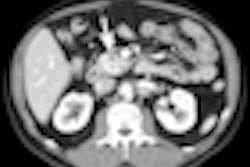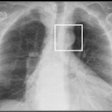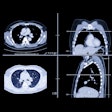
NEW YORK (Reuters Health), Jul 29 - In the past 30 years, diagnostic modalities for pancreatic cancer have improved, but the prognosis has changed little, according to a report in the July issue of the British Journal of Cancer.
Pancreatic cancer is increasing in incidence, the authors explain, but it remains unclear whether developments in its treatment have altered the poor prognosis associated with pancreatic cancer.
Dr. Anne-Marie Bouvier and colleagues from Universite de Bourgogne, Dijon, evaluated the trends in pretherapeutic evaluation, stage at diagnosis, treatment, and survival of pancreatic cancer in a well-defined French population over the past 30 years (1976-2005).
Over this period, there was a dramatic increase in the use of CT scans and a concomitant decrease in the proportion of cases diagnosed at laparotomy, the authors report.
The proportion of patients diagnosed with stage I or stage II pancreatic cancer increased from 2.8% to 10.4%, but most patients continue to be diagnosed with advanced pancreatic cancer.
Over the last 30 years, more patients underwent resection for cure and received adjuvant chemotherapy, and operative mortality after surgery for cure decreased significantly, from 28% in 1976 to 5.1% in the most recent decade (p < 0.001).
The proportion of patients who received palliative chemotherapy quadrupled during the period, from 10.4% to 41.8%.
Five-year relative survival more than doubled between the first and last time periods, the researchers note, but it remained at only 4.2% overall. Five-year survival rates were higher after resection for cure (25.7%) than after other treatment modalities (2.0%).
Survival was also higher for females than for males and for patients under 65 years than for older patients.
"Detection of asymptomatic pancreatic cancers remains a challenge, as high-risk groups for pancreatic cancer are not sufficiently known," the investigators say.
A "reliable serological biomarker" with a high likelihood of being able to identify underlying asymptomatic pancreatic cancer is needed to yield a successful screening strategy, the authors conclude. "In addition, improvements in treatment are still needed."
Br J Cancer 2009;101:215-218.
Last Updated: 2009-07-28 15:20:38 -0400 (Reuters Health)
Related Reading
Stereotactic radiotherapy for pancreatic cancer remains controversial, March 16, 2009
DNA variations may predict outcome in pancreas cancer, January 15, 2009
Perfusion CT predicts treatment response for pancreatic cancer, January 2, 2009
Extra therapy a plus after pancreas cancer surgery, January 22, 2007
Copyright © 2009 Reuters Limited. All rights reserved. Republication or redistribution of Reuters content, including by framing or similar means, is expressly prohibited without the prior written consent of Reuters. Reuters shall not be liable for any errors or delays in the content, or for any actions taken in reliance thereon. Reuters and the Reuters sphere logo are registered trademarks and trademarks of the Reuters group of companies around the world.


















